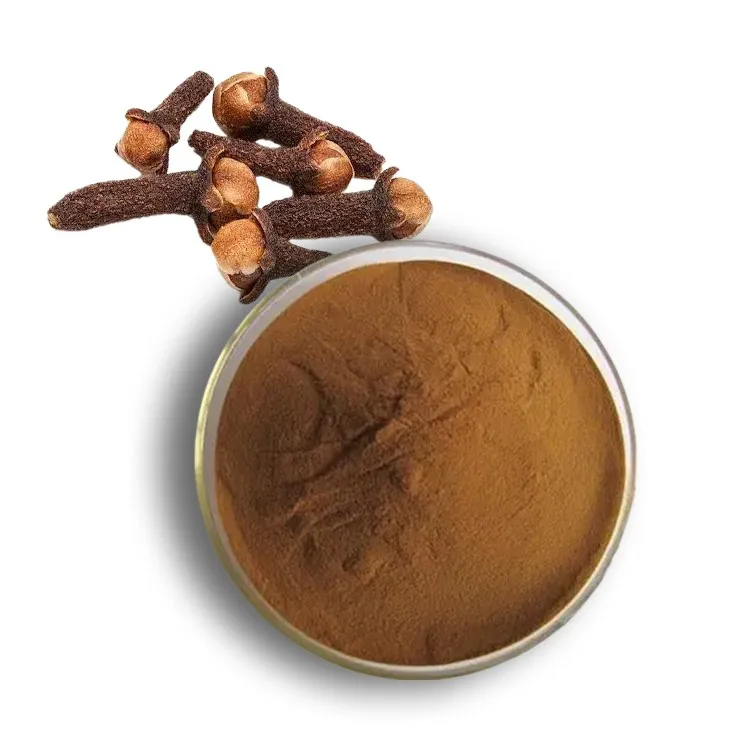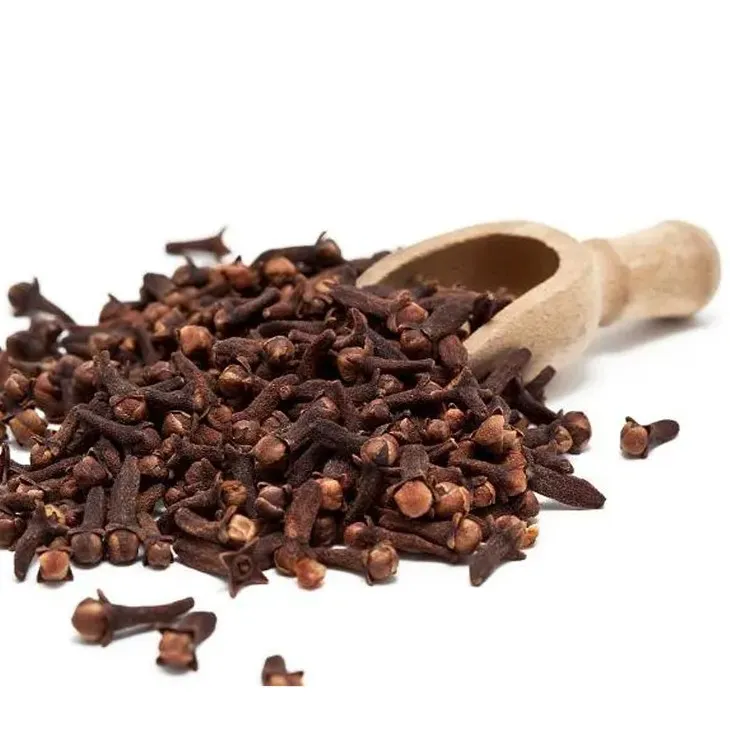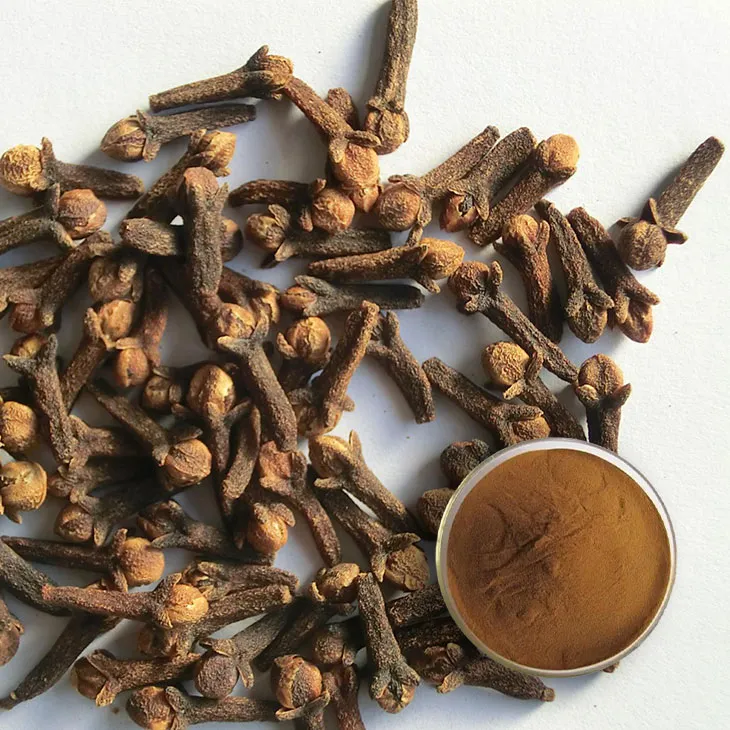- 0086-571-85302990
- sales@greenskybio.com
Clove powder: Benefits, uses and possible side effects.
2024-11-12

1. Introduction
Clove Powder, which is made from dried cloves, has been used for centuries in various cultures around the world. It has a unique aroma and flavor that makes it a popular ingredient in cooking, as well as a valuable component in traditional medicine. In recent years, scientific research has also begun to explore the potential health benefits of Clove Powder, which has led to increased interest in this versatile spice.

2. Nutritional Composition of Clove Powder
Clove powder is rich in a variety of nutrients and bioactive compounds. It contains antioxidants such as eugenol, which is one of the main components responsible for its health - promoting properties. Additionally, it also has vitamins and minerals, although in relatively small amounts. For example, it contains small amounts of vitamin C, potassium, and magnesium.

3. Health Benefits of Clove Powder
3.1 Antioxidant Properties
The antioxidants in clove powder play a crucial role in protecting the body from damage caused by free radicals. Free radicals are unstable molecules that can cause oxidative stress, which has been linked to a variety of chronic diseases such as cancer, heart disease, and neurodegenerative disorders. By neutralizing free radicals, the antioxidants in clove powder can help to reduce the risk of these diseases.
3.2 Anti - Inflammatory Effects
Clove powder has been shown to have anti - inflammatory properties. Inflammation is a natural response of the body to injury or infection, but chronic inflammation can lead to various health problems. The anti - inflammatory compounds in clove powder can help to reduce inflammation in the body, which may be beneficial for conditions such as arthritis, asthma, and inflammatory bowel disease.
3.3 Antibacterial and Antifungal Activity
Clove powder has strong antibacterial and antifungal properties. It can inhibit the growth of a wide range of bacteria and fungi, which makes it useful for treating infections. For example, it can be used topically to treat skin infections or orally to treat oral infections such as thrush.
3.4 Digestive Health
Clove powder can also be beneficial for digestive health. It can stimulate the production of digestive enzymes, which helps to improve digestion and absorption of nutrients. Additionally, it can also help to relieve digestive problems such as indigestion, bloating, and nausea.
3.5 Pain Relief
The eugenol in clove powder has analgesic properties, which means it can help to relieve pain. It can be used topically to relieve toothache, muscle pain, and joint pain. Additionally, it can also be taken orally to relieve other types of pain.

4. Uses of Clove Powder
4.1 Culinary Uses
Clove powder is a popular spice in cooking. It is often used in sweet and savory dishes, such as cakes, cookies, curries, and stews. It adds a warm, spicy flavor to the dishes and can also enhance the aroma. In baking, it is often combined with other spices such as cinnamon, nutmeg, and allspice.
- Clove - flavored Desserts: Clove powder can be used to make delicious desserts such as clove - spiced apple pie, where it complements the sweetness of the apples and the buttery crust.
- Savory Dishes: In savory cooking, it can be added to meat dishes like roast pork or lamb, where it helps to cut through the richness of the meat and adds a depth of flavor.
- Beverages: Clove powder can also be used to flavor beverages. For example, it can be added to mulled wine or hot cider, giving them a warm and spicy taste.
4.2 Medicinal Uses
In traditional medicine, clove powder has been used for a variety of medicinal purposes. It can be used topically as a poultice or ointment for skin conditions or as a mouthwash for oral health. Orally, it can be taken in the form of a tea or tincture for digestive problems, pain relief, or to boost the immune system.
- Topical Applications: For skin infections or minor wounds, a paste made from clove powder and a little water can be applied. The antibacterial and anti - inflammatory properties can help in the healing process.
- Oral Health: Clove powder can be used to make a natural mouthwash. It can help to kill bacteria in the mouth, freshen breath, and relieve toothache.
- Internal Use: Drinking clove tea, which is made by steeping clove powder in hot water, can help with digestive discomfort and may also have a warming effect on the body during cold weather.
4.3 Cosmetic Uses
Clove powder is also used in the cosmetic industry. It can be added to soaps, lotions, and creams for its antibacterial and aromatic properties. It may also help to improve the condition of the skin by reducing inflammation and promoting cell renewal.
5. Possible Side Effects of Clove Powder
5.1 Allergic Reactions
Some people may be allergic to clove powder. Allergic reactions can range from mild symptoms such as skin rashes, itching, and hives to more severe symptoms such as difficulty breathing, swelling of the face, lips, or tongue, and anaphylactic shock. If you experience any signs of an allergic reaction after using clove powder, you should seek medical attention immediately.
5.2 Gastrointestinal Disturbances
Taking large amounts of clove powder may cause gastrointestinal disturbances such as nausea, vomiting, diarrhea, and abdominal pain. This is because the compounds in clove powder can be irritating to the digestive tract. It is important to use clove powder in moderation.
5.3 Blood - Clotting Effects
Clove powder may have an effect on blood - clotting. It contains compounds that can inhibit platelet aggregation, which means it may increase the risk of bleeding. People who are taking blood - thinning medications or have bleeding disorders should be cautious when using clove powder.
6. Precautions and Considerations
When using clove powder, it is important to take the following precautions:
- Allergy Test: If you are using clove powder for the first time, it is advisable to do a patch test on a small area of skin to check for allergic reactions.
- Dosage: Use clove powder in moderation. Avoid taking large amounts, especially if you are pregnant, breastfeeding, or have a pre - existing medical condition.
- Interaction with Medications: If you are taking medications, especially blood - thinning medications, consult your doctor before using clove powder to avoid potential interactions.
7. Conclusion
Clove powder is a versatile substance with a wide range of benefits and uses. It offers antioxidant, anti - inflammatory, antibacterial, and analgesic properties, which make it valuable in both cooking and traditional medicine. However, it is important to be aware of the possible side effects and take appropriate precautions when using it. With proper use, clove powder can be a beneficial addition to a healthy lifestyle.
FAQ:
What are the main antioxidants in clove powder?
Eugenol is one of the main antioxidants in clove powder. It has the ability to scavenge free radicals effectively, which helps in protecting the body's cells from oxidative damage.
How is clove powder used in traditional medicine for anti - inflammatory purposes?
In traditional medicine, clove powder can be made into poultices or tinctures. It may be applied topically to areas of inflammation, such as swollen joints or skin irritations. When ingested in small amounts, it is believed to have internal anti - inflammatory effects on the digestive system and other organs.
What are the symptoms of an allergic reaction to clove powder?
Symptoms of an allergic reaction to clove powder may include skin rashes, itching, swelling, especially around the mouth or face if the powder has been ingested or come into contact with the skin in those areas. In more severe cases, there may be difficulty breathing or swallowing.
Can clove powder be used in baking?
Yes, clove powder can be used in baking. It adds a warm, spicy flavor to baked goods such as cakes, cookies, and bread. It is often used in combination with other spices like cinnamon and nutmeg to create a complex and delicious flavor profile.
Is it safe to use clove powder daily?
While small amounts of clove powder are generally safe for most people, using it daily in large quantities may not be advisable. High doses could potentially lead to side effects such as stomach irritation. Pregnant women should also be cautious, as excessive use may have implications for fetal health.
Related literature
- The Health Benefits of Clove: A Review of the Current Literature"
- "Clove Powder: Chemical Composition and Its Therapeutic Applications"
- "Antioxidant Properties of Clove and Its Components in the Human Body"
- ▶ Hesperidin
- ▶ Citrus Bioflavonoids
- ▶ Plant Extract
- ▶ lycopene
- ▶ Diosmin
- ▶ Grape seed extract
- ▶ Sea buckthorn Juice Powder
- ▶ Fruit Juice Powder
- ▶ Hops Extract
- ▶ Artichoke Extract
- ▶ Mushroom extract
- ▶ Astaxanthin
- ▶ Green Tea Extract
- ▶ Curcumin
- ▶ Horse Chestnut Extract
- ▶ Other Product
- ▶ Boswellia Serrata Extract
- ▶ Resveratrol
- ▶ Marigold Extract
- ▶ Grape Leaf Extract
- ▶ New Product
- ▶ Aminolevulinic acid
- ▶ Cranberry Extract
- ▶ Red Yeast Rice
- ▶ Red Wine Extract
-
Pomegranate Extract
2024-11-12
-
Chasteberry Extract
2024-11-12
-
Cranberry Extract
2024-11-12
-
Horse Chestnut Extract
2024-11-12
-
Lemon Extract
2024-11-12
-
Fenugreek Extract Powder
2024-11-12
-
Withania Somnifera Extract
2024-11-12
-
Berberis aristata Extract
2024-11-12
-
Aguaje Extract
2024-11-12
-
Hesperidin
2024-11-12





















